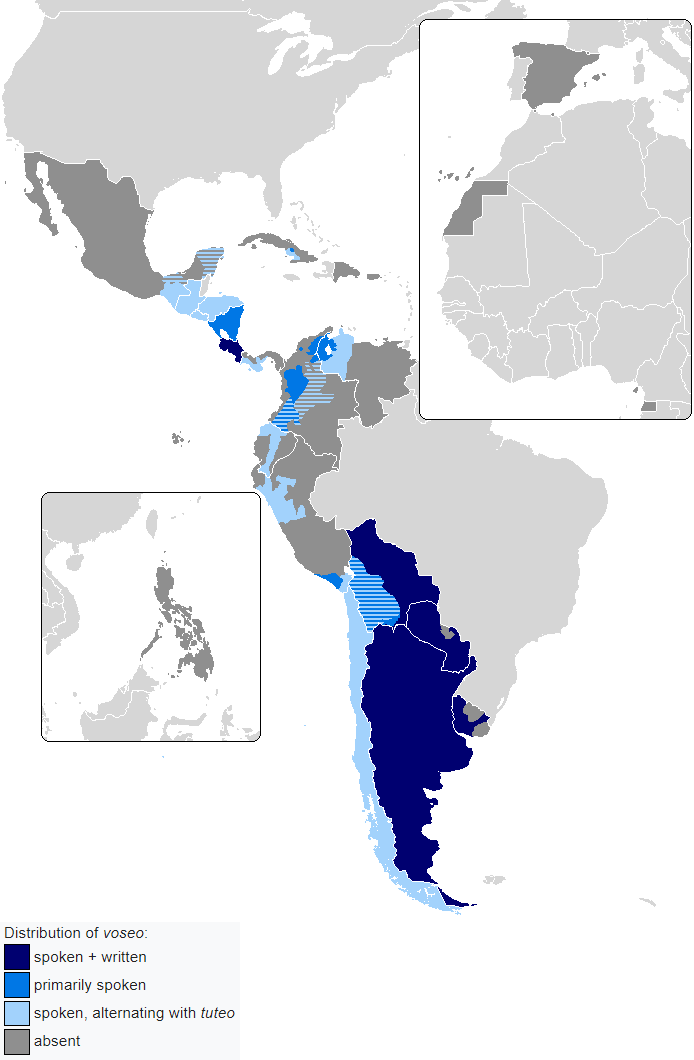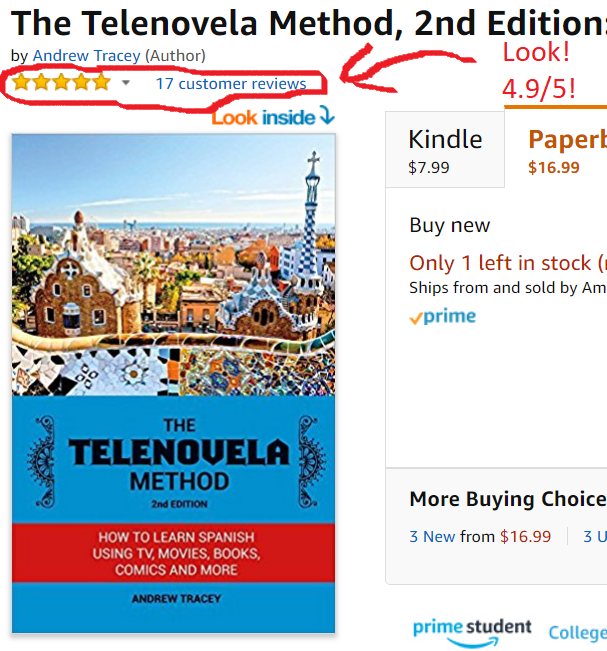
Tú, usted, vosotros, vos, and ustedes all correspond to “you” in English. They are sometimes interchangeable but not usually (e.g. you can use either “tú” or “vos” a lot of the time in places where “vos” is in common use). Each one has a specific context in which that specific pronoun, and usually only that specific pronoun, is appropriate. It gets worse: it varies by country. It gets worse still: it frequently varies by region within a certain country (e.g. frequently when “usted” would be used in Bogotá, Colombia, “vos” would be used in Medellín, Colombia). Now, odds are you do not need to know which pronoun is used, and when, for every single Spanish-speaking region of the world. The following information is for you to decide which pronouns to focus on studying and the contexts you want to train yourself to use them in.
Let’s begin.
I should quickly note that there are several different forms of voseo (ways to use “vos”), typically grouped into types (1, 2, and 3), such as using the pronoun “vos” with verbs conjugated for “tú” and vice-versa. Don’t worry too much about them here, I’ll go into more detail in the section on “vos”.
Additional note that I’ve just realized is necessary: when I say that “tú” or “vos” is used, without further explanation, I mean that the pronoun itself is used normally with its normal verb conjugations, e.g. “they use tú” means they say “tú hablas” or “tú andas”, that is the verbs are conjugated to match the pronoun. When it’s some weird combination of one pronoun and verbs conjugated for a different pronoun (not uncommon) I’ll say so.
Argentina
“Vos” is predominant regardless of context, age, or social status. It is of the Type 3 variety. The pronoun “tú” is virtually unused here except in the very northern part of the country. However, what some of them do in the subjunctive mood (and only in the subjunctive, note) is use the pronoun “vos” along with the “tú” conjugation of the verb with emphasis shifted to the final syllable, e.g. “Vos hablás”, “Vos caminás”, etc. This makes learning this particular type of voseo for the subjunctive very easy if you already know how to conjugate verbs for “tú” (yes, just say “vos” instead of “tú” and then add an accent to the final vowel). Wikipedia tells me this is only done by those less educated and of lower class, whereas those of the middle and upper classes simply use the normal “tú” conjugation of the verb but with the pronoun “vos”, e.g. “vos hablas” (not “vos hablás”), “vos caminas” (not “vos caminás”), etc. The specific language I’m referring to is this:
Para el subjuntivo, existe variación social.
“En el español rioplatense, la forma considerada estándar y empleada en los medios escritos y por las capas medias y altas de la sociedad, es idéntica a la que se emplea para tú; en algunos casos, principalmente en los estratos sociales más bajos y de menor instrucción, el acento se desplaza a la última sílaba por asimilación a la forma de indicativo (que tú comas -> que vos comás, que tú digas -> que vos digás), perdiéndose también la alternancia vocálica (que tú pierdas -> que vos perdás). En algún caso, la forma resultante no es idéntica a la del indicativo del verbo (que tú duermas -> que vos durmás, no durmás).”
From: https://es.wikipedia.org/wiki/Voseo#Voseo_dialectal_americano
“Vos” is used in both written and spoken language. If you’re going to Argentina you absolutely must learn this type of voseo and you should prioritize your study of its use over that of “usted” or “tú”. As in all other countries “usted” is used in situations formal enough to require it, but in Argentina those are very rare and you’re extremely unlikely to encounter them.
Bolivia
Interestingly, the information I’ve found says that “tú” is used amongst the more educated classes whereas everyone else uses “vos” (Type 1). Yes, you can find geographical distribution information that goes into a lot more detail but I suspect you’ll find it roughly matches the previously mentioned socioeconomic demographic, that is it’s following the people, the people aren’t conforming their speech to abstract geographical boundaries. Who you’re speaking to here is what matters, not where (it’s just that you’re more likely to find certain people in certain places than others). If you’re in an upscale restaurant in Santa Cruz (largest city) where all the clients are using “tú” but your server is from a more rural area, probably they’ll address you as “vos” and be more comfortable if you do the same with them.
Chile
“Vos” (Type 3) is more common but, as in Bolivia, “tú” has a kind of prestige to it and as such is used by the upper classes and those with more formal education. The most common form of address is with the pronoun “tú” but with the verbs conjugated for “vos”.
Colombia
I’m in Colombia at the moment and it’s a bit interesting because the popular form of address is currently in transition. It used to be almost entirely “usted” for everything and everyone, and there are a lot of people (usually 35-40 and up) who still do that. However, “vos” is used in some parts (principally in and around Medellín and the Pacific coast in the South) and is of Type 1. “Tú” is the most common form of address in the northern coastal regions (e.g. Cartagena, Santa Marta), but “usted” is probably the predominate form of address in Colombia in general, though I’ve found “tú” more common amongst younger people. Definitely use “usted” with people significantly older than you, of significantly higher status, or in formal situations. Do not call someone’s grandmother “tú” (it’s going to sound odd to them even if you’re the same age and status because, as I said, people of that age are still very much in the habit of referring to everyone as “usted” regardless of circumstances). I’ve been in Bogota three weeks now and have found most of those under 30 use “tú”, much older than that and they’ll tend towards “usted”. I’ve never heard anyone in Bogota use “vos”.
Costa Rica
Use of “usted” is very common here, it’s the normal form of address for people not close to you and so you can easily default to it without worry of being thought overly formal. “Vos” is the informal form of address and is of Type 3. “Tú” is seldom used. Additionally, it’s frequently seen as “pretentious”, so I’d especially advise you to avoid using it there until you get some input from the locals on the matter.
Cuba
“Tú” is the predominate form of address here, although “vos” is used in certain areas, mainly in the more rural countryside and mountains. The exception to this is Camagüey where “vos” is still the main form of address (Type 1). What’s interesting is that this is the one area outside of Spain where you’ll hear the pronouns “vosotros” and “os” still used, though without the corresponding verb conjugations (they use the voseo conjugation).
Dominican Republic
“Tú” is used between people of roughly the same age and status, otherwise “usted” is used to address those significantly older or in a position of authority (teacher, superior at work, etc.).
Ecuador
“Tú” is used almost exclusively here with the exception of the Northern Sierra, Emerald Coast, and Central regions where “vos” will be used as the pronoun but the verb will be conjugated for “tú” (this is Type 2). So regardless of where you’re going you really only need to know the verb conjugations for “tú”.
El Salvador
They use all three (“tú”, “usted”, and “vos”) depending on the context but they don’t conjugate the verbs for “vos” when they use it, instead they use the “tú” form of the verb with the pronoun “vos” (this is Type 3). “Tú” is considered for use in situations of “intermediate formality”, “vos” for informal situations, and “usted” for the most formal ones.
Equatorial Guinea
Sparse information on this one but as best I can tell they mostly just use “tú”.
Gibraltar
See: Spain.
Guatemala
“Vos” (Type 3) is generally used, probably your safest overall option. “Usted” is used as it normally is: with people significantly older or in positions of authority. “Tú” is used between women (sometimes, when they’re friendly with each other), never between men (it’s seen as effeminate and a possible sign of homosexuality).
Honduras
“Vos” (Type 3) for normal, informal conversations, “tú” for slightly more formal ones, and then “usted” for the most formal situations. As with Guatemala, men generally don’t use “tú” with each other.
Mexico
“Tú” is by far the most common form of address. Exceptions include the state of Chiapas and the rural areas of Tabasco, Yucatán, and Quintana Roo where “vos” (Type 3) is primarily used. Members of certain indigenous populations use the pronoun “tú” but with verbs conjugated for “vos” – this is generally considered uneducated low-class.
Nicaragua
“Tú” is used here in more formal situations, though very formal ones require “usted”. “Vos” is the primary form of address (Type 3).
Panama
“Tú” is primarily used, “usted” for very formal situations, and “vos” is rarely heard, except in the extreme west on the border with Costa Rica where it’s Type 1 (also in this area people may alternate “tú” and “vos” while maintaining the “vos” conjugation of the verbs, but only in the present indicative and imperative – this is considered archaic and “rustic” and is fading out).
Paraguay
“Vos” is used almost universally here, no exceptions that I can find.
Peru
Another mess, but only in certain minority regions of the country. Mostly “tú” is used informally and “usted” is used formally and that’s that’. However, “vos” is used in the very north and south. In the north they use the pronoun “tú” with the verb conjugated for “vos” (Type 2). In the south they do the same thing but alternate the pronoun between “tú” and “vos”, but only in the imperative and indicative. In all other forms they just use “tú” normally. “Usted” is used in formal situations as usual. The oddball here is Arequipa where “vos” is used normally.
Puerto Rico
“Tú” is predominant for informal address, “usted” for formal address. The exception is in Fajardo in the far east where “vos” is used (I can’t find information on the type).
Spain
“Tú” is overwhelmingly predominant. It’s used almost always except in formal situations where “usted” is used instead. In interviews on TV, guests are addressed using “usted”, the hosts/anchors address the audience as “ustedes”. If someone is much older than you or it’s a formal situation with apparent status difference (you’re in court talking to the judge), you should probably use “usted”. Other than that, it’s “tú” for just about everything. However, this is also the only Spanish-speaking country where “vosotros” and its corresponding conjugations are widely used, and I do mean widely. Yes, you have to learn how to use “vosotros” properly if you’re going to speak Iberian Spanish, if you want to understand what people are saying. It’s by far the most common way to refer to multiple people in the first person (it’s that or “ustedes”, and “usted” is not often used in Spain). “Usted” is used, it’s just reserved for fairly formal occasions and those don’t happen often for most people. I’m basing this off my personal experience of having lived there (in Zaragoza) for three months in 2015.
Uruguay
“Vos” and the corresponding verb conjugations are accepted without reserve everywhere and amongst all social classes, and their usage mirrors that of Argentina (see “Argentina” above). That said, it’s common to hear the pronoun “tú” used but with verbs conjugated for “vos” and this is seen as having a certain prestige to it. It’s common to hear “tú” used with its matching verb conjugation in the interior of the country, e.g. Rocha, Rivera and departments surrounding Brazil near the Tacuarembó River.
Venezuela
“Tú” is the most common daily form of address with “usted”, of course, being used in more formal situations. “Vos” is used in the northwest of the country in areas around Lake Maracaibo and the Venezuelan Andes. There are two types but from what I’ve read you really only need to concern yourself with one, the “voseo zuliano” (the other, “voseo andino” is a minority dialect and quickly on the way out), which is essentially Type 1. Read more about this (in Spanish) here.
Here’s a visual guide to voseo distribution I stole (it’s creative commons, it’s fine) from Wikipedia:
Here’s a very useful tip that will help countless beginners save face and avoid embarrassing themselves or insulting someone else. This applies everywhere in all situations: “usted” is always safe. You’ll never insult or offend someone by addressing them as “usted”. It might sound odd, stuffy, or overly formal, but you’ll never offend or talk down to someone by calling them “usted”. If you’re 20 years old and speaking to a fellow 20 year-old student in Spain, and you call them “usted”, you’ll probably get a bit of a giggle out of them, but you won’t offend them. If you’re 20 years old and, well just about anywhere (even Spain), and you don’t refer to a 70 year-old with whom you’re not intimately familiar (i.e. not your grandmother) as “usted”, that’s…not good. It’s not a big deal and you’ll likely be given a pass due to your non-native speaker status, but it’s still best we avoid that if we can.
Further Reading and Additional Resources
On Forms of Address and Their Variance (tuteo, ustedeo, voseo, etc.)
The Spanish-language Wikipedia article on Voseo is where I got most of my information on this, check it out if you speak Spanish. The English version is pretty good but not quite as detailed or up to date.
Forms of Address in the Spanish of the Americas – This is an academic text, sometimes out of print and always expensive (~$100US depending on which version you buy). If you really want advanced, detailed research on the matter from a reputable source, I’d consider this. There’s an e-book version available in the Google Play Store for about $88.
Also, please consider having a look at a similar article I wrote called, What Spanish Verb Tenses You Should Learn First, and Why They’re So Important, it does address tengentally forms of address, that is how often you’ll use which.
I learned to speak conversational Spanish in six months using TV shows, movies, and even comics: I then wrote a book on how you can, too
It’s currently available in both e-book and paperback from:
Cheers,
Andrew








